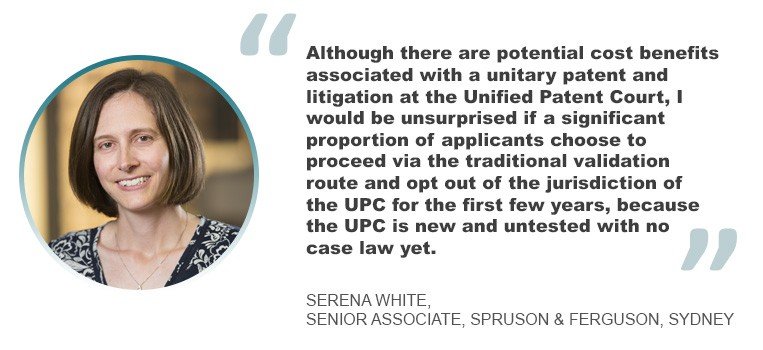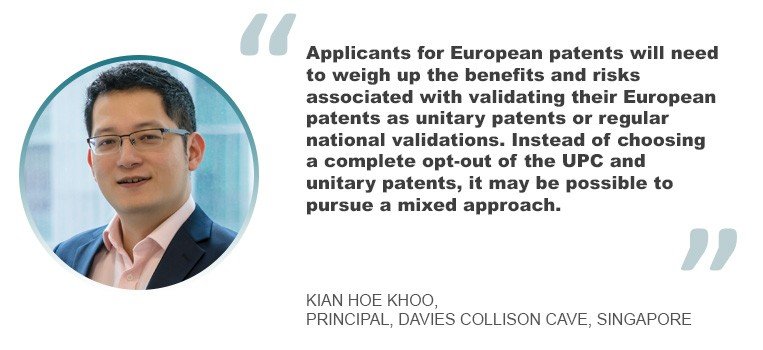The unitary patent in Europe: How will it affect Asia and the Pacific?
31 March 2023

Come June 1, 2023, the unitary patent takes effect in Europe, allowing applicants to obtain a single European patent with a unitary effect covering multiple countries. Under the new unitary patent system, when a European patent application is granted, it essentially becomes a “bundle” of individual national patents – one in each state in which the patentee chooses to have it validated. Each national patent derived from the European application gives its proprietor the same rights as would be conferred by a national patent filed directly at a national patent office. Litigation will still take place on a national basis, and different outcomes in relation to validity and infringement are possible in each jurisdiction.
With this unitary patent, applications will still be examined by the European Patent Office (EPO) in accordance with the European Patent Convention (EPC) and opposition after grant will continue to be available in the same way as it is now.
However, it will be possible to request unitary effect for patents that are granted after the relevant legislation comes into force (provided that the filing date is on or after March 1, 2007, the date Malta joined the EPC).

However, it will be possible to request unitary effect for patents that are granted after the relevant legislation comes into force (provided that the filing date is on or after March 1, 2007, the date Malta joined the EPC).
“Although there are potential cost benefits associated with a unitary patent and litigation at the Unified Patent Court (UPC), I would be unsurprised if a significant proportion of applicants choose to proceed via the traditional validation route and opt out of the jurisdiction of the UPC for the first few years,” says Serena White, a senior associate at Spruson & Ferguson in Sydney. “This is because the UPC is new and untested with no case law yet.”
She adds: “If an existing patent is not opted out during the sunrise period (March 1, 2023, to May 31, 2023), a third party could take action against an existing European patent as soon as the UPC Agreement comes into force (June 1, 2023), after which opting out would not be possible due to the pending court action. In addition, despite the potential benefits of a single litigation process for patent enforcement, I expect many patentees may be cautious and would prefer to opt-out at least their most valuable patents for at least the first few years until a body of case law has been established at the UPC.”
Non-unitary patents in Asia and the Pacific
White says that holders of European patent rights will be affected in the same way regardless of where they reside, meaning patent holders in Asia and the Pacific regions should make sure they understand the impacts of the new legislation.
“However, it seems unlikely that similar laws for patents with unitary scope and multi-jurisdictional effect will arrive in Asia any time soon,” she says. “The new laws in Europe are enabled by the existence of the EPO as a regional patent office together with the legislative framework of the European Union.”

This is echoed by Kian Hoe Khoo, a principal at Davies Collison Cave in Singapore, who says that during the transitional period of seven to 14 years, both the UPC and the national courts of the participating member states will have jurisdiction for litigation relating to non-unitary European patents unless the patentee has “opted-out” in respect of that patent.
“If the patentee does not “opt out” in respect of the patent, existing granted non-unitary patents could be subject to central revocation in the UPC,” he says. “Such revocation would be effective in all EPC member states that participate in the UPC following a successful validity challenge.”
Before the UPC and the unitary patent come into effect on June 1, 2023, there will be a three-month “sunrise period” from March 1 to May 31. During the sunrise period, patentees can opt out of the UPC having jurisdiction over their European patents. Taking this action will protect the patents from being subject to central revocation by the UPC.
“Once the UPC comes into effect on June 1, it will still be possible to opt out in respect of non-unitary European patents and applications during the transitional period mentioned above, provided no action is pending at the UPC at the time. It is also possible to reverse opt out requests if no UPC proceedings are pending in a national court,” he says.
He adds: “Applicants for European patents will need to weigh up the benefits and risks associated with validating their European patents as unitary patents or regular national validations. Instead of choosing a complete opt-out of the UPC and unitary patents, it may, for example, be possible to pursue a mixed approach, using regular national validations and opt-outs for important patents to avoid the risk of central revocation, while pursuing unitary patents, with additional national validations as necessary, for less important patents.”
Khoo says that in view of the above developments, all European patent rightholders and applicants may wish to identify patents and applications that could come under the jurisdiction of the UPC, and then decide as to whether to opt out.
“It is also now possible to request the postponement of the decision to grant when replying to a notification of allowance of a European patent under Rule 71(3) EPC,” he says. “The EPO will then delay the decision to grant so that the publication of the grant is published in the European Patent Bulletin on or immediately after the date of entry into force of the regulations implementing the unitary patent. This will provide the opportunity to obtain a unitary patent should one be desired.”






